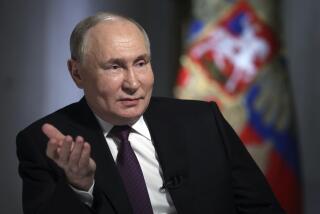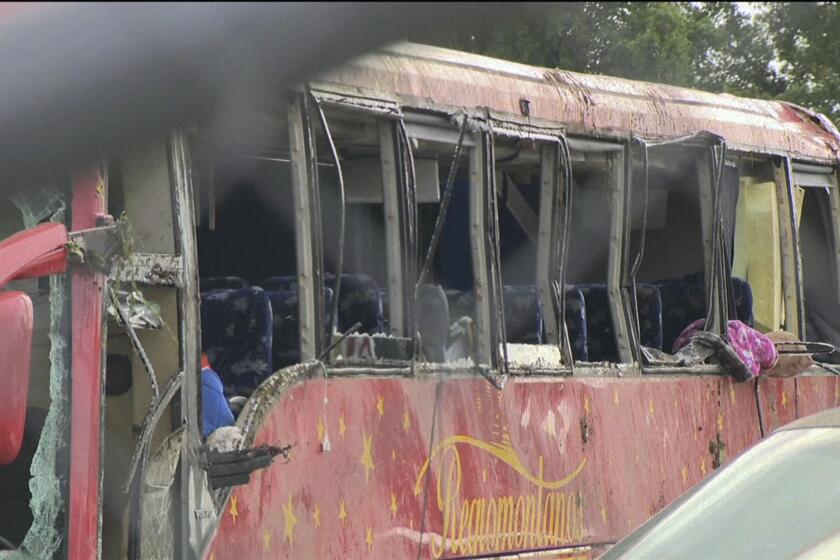A Reinvigorated Gorbachev Pledges to Make Strict Demands on Key Industries : Soviet Union: He says he is fed up with cheap populism and threatens to use ‘the very toughest measures’ to pull the country out of its economic crisis.
President Mikhail S. Gorbachev, bolstered by a run of political victories, declared on Friday that he is about to impose a strict new regime on key Soviet industries in response to public demand for “tough measures--right up to the very toughest measures.”
Gorbachev, showing some of the old sparkle that has rarely shone through the economic gloom in recent months, told the national legislature that he was fed up with cheap populism and was determined to take the unpopular measures needed to pull the country out of its economic crisis.
“We’ll scuttle all our programs if we fail to take the situation in hand,” he told lawmakers in strident tones. “We cannot backpedal. If we do, everything will collapse.”
He did not specify what he meant by the “toughest measures,” but said that he plans to introduce, immediately after the May Day holiday, “a special, stringent regime of work and control” in vital industries, including those producing consumer goods.
Prime Minister Valentin S. Pavlov has called for crackdowns in the energy, transportation and banking sectors, and he suggested that the government use troops to keep order in strike-torn industries and bring charges against managers who violate its orders.
“Constitutional order should be maintained,” Gorbachev said, “and when necessary, we should resort to tough measures--right up to the toughest measures.”
The Soviet president gained the political momentum to move toward this new phase in the country’s economic reforms from three major triumphs this week.
On Wednesday and Thursday, he vanquished his hard-line opponents on the Communist Party Central Committee with the simple but effective threat that if they kept attacking him and his policies, he would resign as party chief.
“I raised the question of stepping down,” Gorbachev told the Supreme Soviet, indignantly recounting the previous day’s battle. “And then they immediately started to think about what’s what.”
On Tuesday, he won legislative backing for his government’s latest “anti-crisis” program, which combines harsher economic discipline with faster moves toward shifting the economy from central planning to a market-driven system.
And also on Tuesday, in what is likely to become a turning point in Gorbachev’s efforts to hold the country together, he managed to reach agreement with nine of its 15 constituent republics on the main points of a new federation treaty that will become the basis for a revamped Soviet Union.
Describing the intense, daylong talks at a dacha near Moscow that led to the agreement, Gorbachev said that the participants had understood that the time had come to put aside their differences--including “human likes and dislikes”--for the sake of the country’s salvation.
“If we can’t do things that way, we’ll simply be swept out of power, no matter what we preach,” Gorbachev said. “This is the moment when the general interest takes precedence over all group interests.”
Like the charismatic Gorbachev of the heady early days of perestroika, he joked easily with the Supreme Soviet deputies, chiding one for not reading press accounts of his recent trip to Japan and joking about the dinner the republic leaders enjoyed during a break in their negotiations.
The agreement among what the Soviet media have christened “The Ten”--nine republics plus Gorbachev’s Kremlin--represents particularly important progress in the Soviet president’s stormy relations with Russian Federation leader Boris N. Yeltsin, his main political rival.
Yeltsin reported on the talks to his own legislature on Thursday, and referred to Gorbachev with mild praise instead of taking his usual swipe at the Soviet president.
“For the first time, the president showed a high degree of human response and refrained from pressing his former views,” Yeltsin told the closed-door session, according to the Interfax news agency.
The agreement specifies that the formal federation treaty uniting The Ten should be signed soon, followed within six months by a new Soviet constitution and later by new elections to correspond with newly created government bodies.
The six republics that have declared themselves intent on full independence--Latvia, Lithuania, Estonia, Moldova, Georgia and Armenia--did not participate in the talks, but Gorbachev said that he had since received encouraging telephone calls from representatives of three of them asking what had happened and why they had not been invited.
The agreement included an appeal by all its signers to workers across the Soviet Union to refrain from striking, but that did not keep hundreds of thousands of workers across Russia from staging a one-hour walkout Friday to demand higher salaries and better working and living conditions.
Altogether, about 50 million people either stopped work or participated in political meetings, during which workers agreed on lists of demands, according to the state-run news agency Tass.
The 60-million-member Federation of Independent Trade Unions of Russia called the strike to show Moscow that the people will not continue to work diligently while their living standards plummet, Chairman Yevgeny V. Arapov said.
In the vast oil fields of Tyumen, 290,000 workers halted their labor for an hour to demand better living conditions and pay increases in relation to inflation, Arapov said.
At the main airport in the Ural Mountains industrial city of Sverdlovsk, 5,000 workers gathered to demand salary supplements twice as large as those they now receive to help them buy food and other consumer goods at the new higher prices, according to Arapov.
Support for the strike was smaller than originally planned because the Russian government had already met three of the federation’s main demands: setting a minimal wage, agreeing to 24 days of vacation for all workers and establishing a 40-hour workweek.
“Our main demands were already fulfilled, so it’s not surprising that many people are not supporting our strike,” Arapov said.
More to Read
Sign up for Essential California
The most important California stories and recommendations in your inbox every morning.
You may occasionally receive promotional content from the Los Angeles Times.






